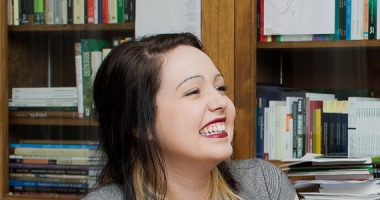
Doctoral Student in Curriculum Studies, Teacher Development & Engineering Education Specialist
Connect on LinkedIn Connect on 10,000 CoffeesStacy Costa (B.A., 2016) says that Professor Marcel Danesi’s course on puzzles opened up another aspect of her university experience. She took an avid interest in his course and she now works with him to create weekly puzzles for the Toronto Star, as well as completing a Ph.D with a focus on Teacher Development & Engineering Education. Stacy’s recent work includes working with a food company to design puzzles for a nationwide marketing campaign and teaching a course at the School of Continuing Studies. Read more about Stacey here.
Within two years of graduation, 82% of graduates who are in the labour market are employed with a median salary of $47,105/year upon entering the workforce. 64% pursue further post-secondary studies. (Source: StatsCan Career Tool)
University of Toronto Anthropology alumni most frequently apply their research and critical thinking skills in these industries:
An Anthropology degree equips students with the collaboration and analysis skills for a variety of academic next steps, including graduate programs in:
Register for the Job Shadowing Program to connect with professionals in your career area of interest. During a half or full day job shadowing placement, you’ll begin to clarify your goals and better understand your career options.
Attend an In the Field program to meet professionals working in a variety of occupations within one organization.
Find a Work-Study Position and gain paid, on-campus positions that provide you with an opportunity to deepen your knowledge, strengthen your skills and explore how your academic studies translate to career possibilities.
Attend a career workshop or small group conversation to explore career possibilities, understand your skills, and plan for your career or further education. Visit clnx.utoronto.ca for more information.
The Backpack to Briefcase (b2B) program provides opportunities for students and recent graduates, to meet and mingle with alumni, faculty, staff and fellow students from their department or academic unit. Alumni who volunteer for b2B Industry Nights, Career Panels, Speed Networking events and Mentorship Meals, offer guidance, career advice and encouragement to A&S students. By taking part in b2B, students will learn about the array of career possibilities available to them as A&S degree recipients.
While you’re a student, get the support and make the connections you need to transition into your dream career.
Talk to your professors to better understand and prioritize your opportunities in the context of your discipline.
Participate in a mentorship program and attend social and academic events organized by your student union.
Take advantage of chances to do fieldwork, volunteer in a lab, participate in a research opportunity course or an international research excursion course.
Attend guest lectures to meet anthropologists from around the world and meet potential mentors.

Doctoral Student in Curriculum Studies, Teacher Development & Engineering Education Specialist
Connect on LinkedIn Connect on 10,000 Coffees